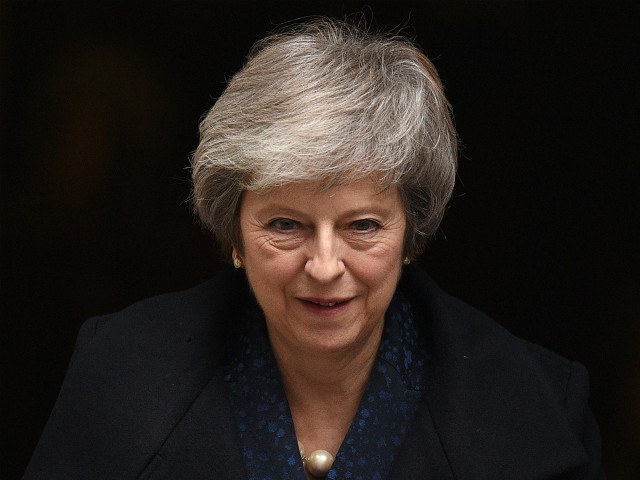
Theresa May is just hours away from a party ballot that could almost immediately end her leadership. But despite the best efforts of Tory rebels, the Prime Minister appears confident of success — and the plot may even backfire.
While the United Kingdom endures one of the most remarkable periods of politics in living memory with tousling over the future of Brexit and the prime minister fighting a vote of no confidence from her own party in her leadership, she appeared to conduct the weekly questions and answers session in the British Parliament Wednesday from a position of confidence.
Entering into a packed chamber — the British Parliament has more members than seats, so many were left standing — May was met by enthusiastic cheers from her own Government benches which seemed to carry with a volume and duration greater than normal.
BREAKING: Tories Trigger Vote of No Confidence in Prime Minister Theresa May https://t.co/GVxfxhSm98
— Breitbart London (@BreitbartLondon) December 12, 2018
Near-certainly arranged by May loyalists and government whips to portray a sense of unity, the Prime Minister nevertheless appeared calm in the exchanges, while the left-wing leader of the opposition Jeremy Corbyn seemed close to losing his temper at times.
Despite the apparent blow of a vote of no confidence against her, the Prime Minister may have much to cheer her, all of which could be bad news for keen Brexiteers who want to see her stand aside for fresh leadership to take Britain out of the European Union fully.
JUST IN: 158 Conservative MPs publicly indicate support for Prime Minister May ahead of #NoConfidence vote pic.twitter.com/LsXDsNU42O
— Reuters UK (@ReutersUK) December 12, 2018
The fact it has taken months for Tory rebels to scrape together enough letters of no confidence to trigger a vote, with top Eurosceptic Jacob Rees-Mogg calling for his colleagues to get theirs signed back in November, may imply there is less momentum behind Brexiteers in Parliament than hoped for by many.
This is a feature of the present Parliament, which is distinctly unrepresentative of the nation as a whole. While 52 per cent of voters chose to leave the European Union in the 2016 referendum, around 75 per cent of MPs are believed to have voted to remain. This means that many remain-supporting MPs represent leave-voting areas, and leaves a Parliament hoping broadly to frustrate the Brexit process — if not stop it altogether — at odds with the British people.
When Theresa May spoke to the House of Commons on Monday and asked rhetorically whether the House wanted to deliver Brexit, she was met with shouts of “no”, and incredulous laughter from the benches.
‘In the National Interest, May Must Go,’ Tory Brexiteers, Remainers Fracture on No Confidence Vote https://t.co/a28eVSSGyQ
— Breitbart London (@BreitbartLondon) December 12, 2018
This sheer Parliamentary arithmetic is also good for the longevity of the Prime Minister. Whether to trigger a competition to select the future leader of the Conservative Party is not down to voters, or even party members — only Conservative Members of Parliament are called upon to vote at this stage.
That means the Prime Minister only needs 158 votes to survive tonight, and with less than five hours to go until the vote take place, several news sources including the BBC and Reuters are reporting at least 158 Conservative MPs have already pledged to back the PM in the ballot.
Although it is a secret vote and some may not vote as declared, the number who have come out to bat for Theresa May significantly outweighs those who have gone public to say they will vote for her removal, at just 33 so far.
Delingpole: Everything You Need to Know About This Dog’s Breakfast of a Brexit Fiasco https://t.co/pnOJUwtJf9
— Breitbart London (@BreitbartLondon) December 11, 2018
If the vote goes for the Prime Minister, she is likely to claim it as a further endorsement of her deeply unpopular Brexit plan — which has been rejected by Brexit leader Nigel Farage as “the worst deal in history” — and it may even inadvertently strengthen her position.
Tory rules mean if a leader survives a vote of no confidence they cannot be challenged again for 12 months, meaning the Prime Minister gains a level of invulnerability from Brexiteer rebels within Parliament if they end up holding a busted flush.
What all this means for Brexit, whatever way the vote goes, will remain frustratingly unclear to both the voting public and those within the Westminster bubble. While Brexiteers in Parliament work to remove May in the hope of seeing a new Prime Minister to lead the nation to a full Brexit, they lack the numbers to control who the likely candidates for her replacement might be.
Equally, leaving the Prime Minister to continue with her Brexit ‘deal’ agreed with the European Union could see Britain inadvertently engage in a so-called hard no deal — or full — Brexit by default, with the European Union announcing Wednesday that it was now engaging in preparations for that very eventuality.
Farage: Brexit Deal ‘Won’t Pass,’ Voters Oppose Agreement 2 to 1 https://t.co/CZEucA4oYr
— Breitbart London (@BreitbartLondon) December 11, 2018
Oliver JJ Lane is the editor of Breitbart London — Follow him on Twitter and Facebook
http://feedproxy.google.com/~r/breitbart/~3/pEBbGn9IyKQ/